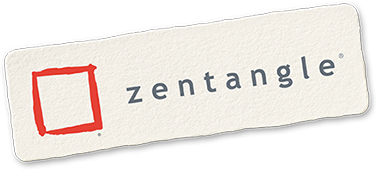Almost twenty years ago, Rick and Maria were inspired to share a method of drawing to help people rediscover the artist within. This drawing method broke down the creation of beautiful art to simple strokes, creating a very easy to learn art form. Before any stroke is made on paper and upon the completion of a tile, the steps of the Zentangle Method are wrapped with Gratitude and Appreciation. Intertwined with the marks on the paper are the philosophies that travel off the paper and into our lives: No Mistakes, Anything is Possible, Tangle Your Own Conclusions, and Turn your Tile. Each of these philosophies allowing for a change of perspective.
There are countless stories of how this simple, yet profound practice of putting pen to paper has transformed lives. It has brought more joy, more creativity, and more friendships to people in all walks of life all over the world. It also benefits people addressing issues such as anxiety, depression, addiction, phobias, pain management, traumatic stress, and more.

How It Began...
It was from a place of gratitude that the inspiration for the Zentangle Foundation came. Judy, one of the over 6000 CZTs in 62 countries, appreciated that Zentangle had been a vital part of her life and her healing and called Rick and Maria with an offer of a donation to support others to become certified Zentangle Teachers. From that seed planted years ago, the foundation continues to grow.
This past year the foundation supported the training of two new Certified Zentangle Teachers. One is an educator of children that uses the Zentangle Method with her students. She finds that her “reluctant” learners are more willing to try to draw tangles than other art projects and have more success in doing it. The second scholarship went to a pair of women who are using the method with veterans and their families to help prevent suicides and “heal moral and spiritual wounds of combat deployment”. Our deepest thank you to you all for the work you are doing.
The foundation also supported the introduction of the Zentangle Method to social workers. The intention of the program was for self-care for the caregivers and “to teach this Zentangle technique as a therapy tool that can address trauma, create calm or help regain focus”. A second grant was awarded to a non-profit organization who focuses on persons living with dementia and their families. The proposal is to use the Zentangle method with members, caregivers, volunteers, and staff. With no cure for dementia, the arts are the best option to enhance the quality of life for the members. For everyone, the Zentangle Method provides an opportunity to decrease stress and develop an enjoyable self-care routine.
Finally in 2021, the Zentangle Foundation sponsored a preliminary study on the effectiveness of the Zentangle Method as a possible therapy with persons with serious mental illness. The results are positive enough to merit a follow up study. You can view the abstract on the Zentangle Foundation website.
There is further research needed to understand what exactly is happening. Why is putting pen to paper so effective? Why does it increase focus, creativity, and induce a calmness? Is it as effective as pharmaceuticals with no side effects? Can we find scientific evidence of what is happening when we engage creativity, and we relax into tangles?
Today is Giving Tuesday, a national day devoted to charitable giving. We are asking for your help in growing the seed that Judy planted so that we can continue to support new certified teachers, organizations that see the benefits of sharing the method, and research to quantify what we experience when we tangle.
We know that there are many organizations deserving of your support at this time of year. As you consider your year-end giving, we hope you’ll remember the impact that the Zentangle Method has had on your life and consider making a donation in honor of
To donate, please visit the Zentangle Foundation website.
As we wrap up this letter we close with gratitude. Gratitude for the beautiful community, for those that have supported us along the way, and for all of you.
Thank you!



Hi zentangle.com administrator, You always provide valuable information.
Toby Machado on
I read the initial abstract of the study done with psychiatric patients and am thrilled to see empirical evidence of what we already suspected—that the practice of tangling changes the brain in positive ways we can only imagine. Looking forward to more.
Vally Sharpe on
Kerin McMillen on
Ginny Stiles on
Heidi Woody on
Ginger White CZT34 on
Alice on
LLS on